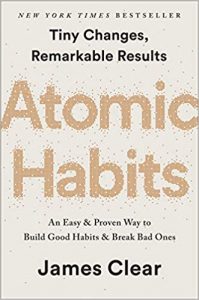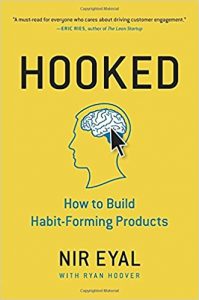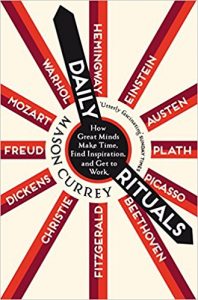Home — Collections — Best Books on Habits and Building Them – The Essential List
Best Books on Habits and Building Them – The Essential List
Table of Contents
“Learning how to break habits is a very important meta-skill that can serve you better in life than almost anything else.” – Naval Ravikant, CEO and Founder of AngelList (source)
What happened with all the goals and promises you made at the beginning of the year? Are you still keeping up with them? Probably not. And it’s not even February yet!
We don’t need any studies to tell us what we already know: most of those things on our New Year’s Resolution list get lost at some point along the way.
Perhaps our targets weren’t realistic from the beginning. Perhaps we made an exception, telling ourselves that it’s “just this one time”, but never managed to get back on track afterwards. Perhaps we didn’t clearly define those new goals, steps we need to make, or how we’re gonna measure our progress. Or we forgot to take into consideration some things that aren’t under our control – as life always loves to mess up with our plans.
What’s even worst is that every time we fall off the wagon, we lose confidence in ourselves. We’re feeling guilty and start labeling ourselves in a negative way. “I can’t do this”. “I can’t quit smoking”. “I’m not an early bird”. “I’m a loser“. And the next time we try to make (or break) another habit, it will be even harder to do it.
I’m not just talking about habits where you’re painfully self-aware of the consequences and you can see results quickly, such as quitting smoking or practicing sports. Those are extremely important, obviously. But there are habits that don’t have a direct, fast and visible effect. They won’t cause permanent damage or ruin your life if they don’t happen, friends and family members won’t stop talking to you, you won’t get sick or die faster. However, it doesn’t mean that you’ll live a fulfilled life.
Here’s a habit that sets high performers apart: they’re all avid readers. Charlie Munger, self-made billionaire and Warren Buffett‘s right hand, was saying: “In my whole life, I have known no wise people who didn’t read all the time – none, zero.”
And, most importantly, they’re reading books with a purpose, so not just for leisure or general education. They avoid shallow articles, wasting time on social media, or summaries of books. They read books because they want to learn new knowledge and master new skills that can help them advance in their career and become indispensable!
They’re aware that the habit of reading is key to advance in their profession, and is becoming increasingly important. The biggest challenges we’ll face will be brought by new technologies, such as artificial intelligence. Millions of jobs are at high risk of being displaced or becoming obsolete, as the way work gets done is changing. Job stability is a long gone dream.
Making and breaking habits, together with learning how to learn will be vital skills. Master these, and you become unstoppable!
If we really want to learn how to make and break a habit, there’s a handful of books that can help us. They can teach us how we form habits, how our brain works, why we don’t always do the “right” thing to break a bad habit, and how to defend ourselves against our own nature.
Give yourself these as a gift at the beginning of this year. They’ll be the best investment you can make in your personal growth. And thank us later.
The essential list of books on making and breaking habits:
1. Atomic Habits, by James Clear
James Clear‘s book is the best manual on how to implement tiny habits that will have an exponential impact on your life. What we love most about his writing style is that it’s extremely down-to-earth and easy to apply. Here’s the Atomic Habits book summary. Here’s what media strategist and one of our favorite authors Ryan Holiday says about it:
“An atomic habit is a tiny habit or change that can have an enormous impact on your life. Getting up a little earlier, deleting social media from your phone, automating your savings, developing a system, these are atomic habits. Me personally, I don’t feel like I am particularly talented or even that disciplined, but I have a number of atomic habits that I started early on that have had a massive compounding benefit. My blurb of this one: “A special book that will change how you approach your day and live your life.”
Also recommended by: author Mark Manson, Noah Kagan (founder of Sumo), Cal Newport and more.
2. The Power of Habit, by Charles Duhigg
This one’s a more technical book, sprinkled with lots of psychology, that can help you understand how our brains are wired. A fascinating read on how we learn to automate some processes, identifying the cues and rewards that we get before and after a habit is activated, and fascinating examples of habits that shifted the lives of successful people and companies.
“It was tremendously eye-opening to realize that our daily lives consist of habits (whether positive, or negative). After reading this book, I began thinking of most of my professional (and partially personal) life as a series of habits that I’ve built over years. Given that your career will likely span hundreds of years, creating and reinforcing positive habits will make a drastic difference over time (much like the principle of ‘compounding’ in finance). This book kick-started a different thinking process for me, centered around optimization of the time I have in a day.” (Sergey Sapelnyk, Co-Founder of Society Socks)
Charles Duhigg‘s book is also recommended by: Joel Gascoigne (co-founder of Buffer), Naval Ravikant (CEO of AngelList), and 11 other entrepreneurs.
3. High Performance Habits, by Brendon Burchard
Brendon Burchard draws from his experience and research – after a decade as the world’s higest performance coach, he put together six habits that made high performers succeed over the long term: seek clarity, generate energy, raise necessity, increase productivity, develop influence, and demonstrate courage.
Here’s why Bogdan Lucaciu, CTO of Adore Me, recommends his book:
“This book does a good job at setting a vision for long-term, consistent high performance in all areas of life.”
4. Hooked: How to Build Habit-Forming Products, by Nir Eyal
If you’re an entrepreneur, marketer or product manager, and you want to learn how to create products that become addictive, Nir Eyal‘s book is a must-read. Erik Cheong, co-founder of Singapore-based startup Park n Parcel, said this about it:
“Another must read for founders who care about driving customer engagement. This book showed me the case study of how Facebook, YouTube & Uber turn technologies into compulsions if not fully-fledged addictions. It provided me the step by step on how I can position my product into a “painkiller” that solves real problems, instead of a “vitamin” that appeals to users’ emotional rather than functional needs.”
Also recommended by: Matt Mullenweg (creator of WordPress), food waste fighter Leah Lizarondo (co-founder of 412 Food Rescue) and 11 other entrepreneurs.
5. Tools of Titans, by Tim Ferriss
For many years, Tim Ferriss interviewed people who are considered among the best in the world at what they do. He took the best lessons from those people and put them together in this book/manual, that came out in December 2016. “Tools of Titans” is divided into three parts: health, wealth and wisdom.
Here’s why Tony Robbins recommends it:
“What I loved about Tools of Titans is that it distills key tactics, routines and habits of the ultra-successful in actionable ways that anyone can take advantage of.”
Also recommended by: entrepreneur and investor James Altucher, Marvin Liao (partner at 500 Startups), Irina Botnari (Managing Partner at Bucur’s Shelter Hostel), and 10 other entrepreneurs.
6. The 7 Habits of Highly Effective People, by Stephen R. Covey
This one’s a classic and, so far, the most recommended habits book on our website. James Murphy, Marketing Manager at Live Nation, talked in our interview about how it helped him:
“Habit 2 of Stephen Covey’s “The 7 Habits of Highly Effective People” states “Begin with the end in mind.” This helped me immensely and immediately on a macro level in terms of motivating me to clarify exactly where I want to be and what I want to be doing in 10-20-30 years. However, it also helped me on a micro level when starting a new project or venture. Starting anything, be it a hobby, business, sport, etc. can be daunting and I believe we often hide by getting caught up in minutiae which takes our eyes off the big “scary” goal (ex. what font should I use on the website?, what putter should I buy?, what programming language should I learn first?). By beginning with the end in mind, I force myself to clearly spell out what success looks like for a particular undertaking and anything trivial that disrupts me from arriving at said goal is tabled.”
Also recommended by: web developer and entrepreneur Mike Benkovich, Faisal Amin (co-founder of Fruitbowl Digital marketing agency), product, growth and design architect Daylon Soh and 21 other successful people.
7. Daily Rituals: How Artists Work, by Mason Currey
Mason Currey’s book will show you the daily habits of 161 of the most inspired and inspiring minds in the world, from novelists to poets, musicians, painters, philosophers and scientists. This book’s great to demolish the myth that artists don’t have a routine and they’re just waiting for inspiration to strike them. As David Brooks was saying: “Creative people think live artists, but they work like accountants.”
This book is recommended by Scott Keyes, founder of Scott’s Cheap Flights:
“Reading Daily Rituals dramatically improved my productivity and work-life balance. It showed me that most great historical figures weren’t workaholics, but instead worked hard (mostly in the morning) and then had plenty of unscripted time in the afternoon to ruminate, digest, and brainstorm. It’s a model I’ve tried to emulate, waking up early in the morning, churning out a bunch of work before lunchtime, and then taking it relatively easy thereafter.”
What book did you find to be most helpful on making & breaking habits?






2 Comments